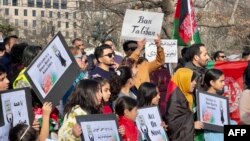From Lafayette Park in front of the White House to the streets of London, Toronto and many other cities around the world, activists have been staging small protests to condemn the Taliban’s repressive policies against women in Afghanistan and call for a stronger international response.
While they attract a relatively small number of participants, the protests have increased in frequency over the last year, largely in response to growing Taliban restrictions on women inside Afghanistan.
On January 14, fewer than 100 protesters showed up at Farragut Square Park in Washington to chant slogans against the Taliban’s recent edict banning universities and work for Afghan girls and women. On the same day, about three dozen protesters gathered in heavy rain in Los Angeles, making similar demands.
“In Los Angeles, we called for an end to the gender apartheid instilled by the Taliban,” Arash Azizada, an Afghan American community organizer, told VOA.
The protests take place as women and civil society activists inside Afghanistan have gone silent under Taliban rule.
'We want to be their voices'
Human rights groups accuse Taliban authorities of forcefully banning protests, detaining and torturing activists, and censoring the media. The Taliban strongly reject the allegations and instead claim they have freed the country from a U.S. invasion.
The protesters outside Afghanistan say they show solidarity with Afghan women whose rights are being crushed under the Taliban’s undemocratic rule.
“We want to be their voices. We want to be their bridge to the world,” said Asila Wardak, a former Afghan diplomat and now a fellow at Harvard University who participated in several protests in the U.S.
The Afghan protesters are part of a widespread global chorus that demands the Taliban immediately reverse restrictions imposed on women’s work and education in Afghanistan.
But the Taliban have remained defiant, giving no clarity about when or whether the will be lifted.
“Anti-government protests outside the country that the government controls (e.g., anti-Iranian government protests that take place in Washington) do not seem to have much impact in the country that the protests concern,” Thomas Carothers of the Global Protest Tracker at the Carnegie Endowment told VOA by email.
“Repressive governments are usually able to control news of such events,” he said.
While U.S. and European officials have often voiced support for Afghan women and have imposed travel and economic sanctions on Taliban leaders and institutions, protesters say the international community should undertake meaningful action to dissuade and disable the Taliban from depriving millions of women of their basic rights.
“Just issuing statements of solidarity with Afghan women is not enough,” said Wardak. “The international community should facilitate opportunities for Afghan women to directly engage the Taliban and demand accountability.”
Azizzada, an activist in Los Angeles, said a meaningful response to the Taliban’s perceived misogyny would be for the U.S. and its Western allies to offer more asylum and educational opportunities for Afghans.
“If Afghan girls cannot learn in Afghanistan, they should be allowed to do so in the United States or elsewhere,” Azizzada said.
Local voices
Since the Taliban seized power in August 2021, more than 150,000 Afghans, among them many women leaders and activists, have been evacuated or given asylum in the U.S., Canada and European countries.
Many evacuees have engaged in high-profile advocacy for change in Taliban-ruled Afghanistan. Some activists have received prestigious awards and fellowships at elite universities, giving them a bully pulpit from which to write for and appear in prominent media outlets.
Now there are concerns that the activists in the Western countries are given too much attention at the cost of women inside Afghanistan.
“Efforts outside of Afghanistan should complement the activism of those inside the country and not hijack the narrative and present unrealistic solutions,” said Obaidullah Baheer, a Kabul analyst.
Even while women are not allowed to advocate for their rights inside Afghanistan, Baheer said, “it should not mean that their voices be ignored.”
That Afghan women have continued to suffer under the Taliban, despite protests and advocacy outside Afghanistan, is not disputed by some prominent activists.
“I believe that protests have impacts on the situation,” Zarifa Ghafari, a former Afghan official who now advocates for Afghan women’s rights from Germany, told VOA. “But I do not have confidence in the scattered gatherings by Afghans, and you have not seen any positive result over the past one and one-half years.”
Taliban officials have largely ignored the Afghan protests abroad or labeled the protesters as Western puppets.
Inside Afghanistan, however, nearly all Afghans have rated their lives as “suffering,” and a majority have said that women are disrespected under the Taliban, according to a recent Pew survey.







